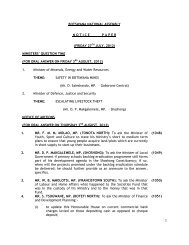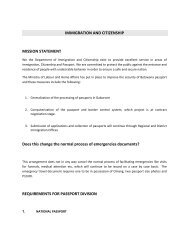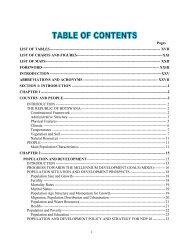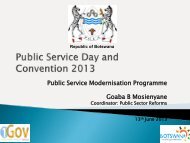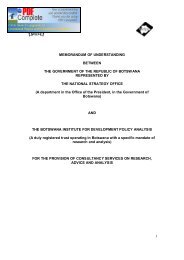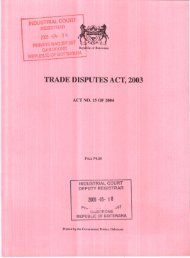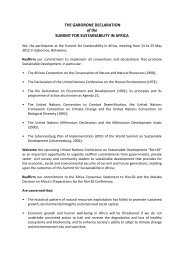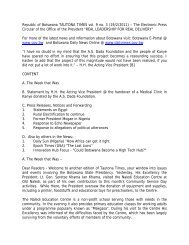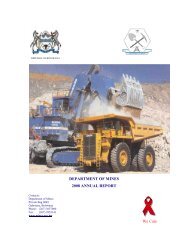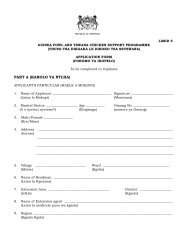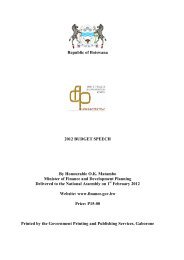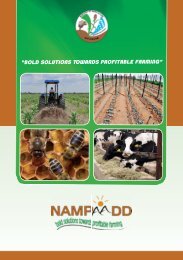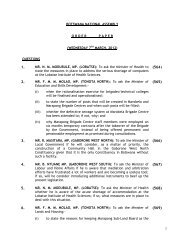Roads Department - Government of Botswana
Roads Department - Government of Botswana
Roads Department - Government of Botswana
Create successful ePaper yourself
Turn your PDF publications into a flip-book with our unique Google optimized e-Paper software.
<strong>Roads</strong> <strong>Department</strong><br />
This approach was used commonly on Rural <strong>Roads</strong> projects where salts were<br />
identified to be problematic.<br />
2.4.5 Prevention <strong>of</strong> Moisture Rise - Cut Off<br />
Salt migration by upward capillary rise <strong>of</strong> soil moisture can be prevented by<br />
placing an impermeable or semi-impermeable membrane in the base course<br />
(French et al 1982). A granular layer in the base course may also reduce capillary<br />
rise (Horta 1985). French et al (1982) experimented with ‘filtram’, a commercial<br />
ge<strong>of</strong>abric, and concluded that neither salt nor groundwater will pass<br />
through the ge<strong>of</strong>abric if placed outside the zone <strong>of</strong> near saturation in the soil.<br />
The provision <strong>of</strong> a coarse grain uniform layer between the sub-base and subgrade<br />
has been shown to be ineffective.<br />
2.4.6 Relevance <strong>of</strong> Published Literature to <strong>Botswana</strong><br />
The published work does not explain the fundamental mechanism <strong>of</strong> the<br />
damage. Existing methods <strong>of</strong> prevention and repair are based mainly on experience<br />
<strong>of</strong> local materials and conditions and should not be used blindly for<br />
<strong>Botswana</strong> conditions.<br />
2.5 Factors Influencing Salt Damage<br />
2.5.1 Climate<br />
Temperature, relative humidity, wind-speed and rainfall all influence salt<br />
damage. They affect evaporation significantly and hence the potential for<br />
upward salt migration. Temperature and relative humidity also determine<br />
whether salt crystallisation thresholds are crossed. This is discussed by Obika<br />
et al (1989). Precipitation influences the net water balance at a given location<br />
and also whether there is a seasonal or perennial moisture deficiency which<br />
would provide the conditions for a net upward saline moisture migration.<br />
Where rainfall is insufficient to leach out minerals from weathering rocks, insitu<br />
accumulation <strong>of</strong> mineral salts generally occurs.<br />
2.5.2 Geology and Hydrogeology<br />
The depth and quality <strong>of</strong> groundwater contributes significantly towards creating<br />
bituminous surfacing damage from salts. Saline groundwater may result<br />
from the solution <strong>of</strong> minerals present in sediments or from the ingress <strong>of</strong> seawater<br />
to the host material. The predominant type <strong>of</strong> salt depends on a variety<br />
<strong>of</strong> geochemical processes, the source <strong>of</strong> the salt and the local climatic environment.<br />
The most commonly encountered salt in many arid and semi-arid zones<br />
is sodium chloride, known as halite.<br />
Weather station measurement <strong>of</strong> local climate<br />
is useful.<br />
In arid and semi-arid zones the capillary moisture rise can be more than ten<br />
metres. The height <strong>of</strong> capillary moisture rise depends on a variety <strong>of</strong> factors<br />
including porosity and temperature gradients.<br />
2.5.3 Materials Characteristics<br />
The various salt types which can contribute to the damage <strong>of</strong> pavements in dry<br />
lands include but are not limited to sodium chloride (NaCl), sodium sulphate<br />
(Na 2<br />
SO 4<br />
), sodium carbonate (Na 2<br />
CO 3<br />
), and magnesium sulphate (MgSO 4<br />
).<br />
18 Chapter 2<br />
Guide to the Prevention and Repair <strong>of</strong> Salt Damage to <strong>Roads</strong> and Runways<br />
Occurrence and Characteristics



